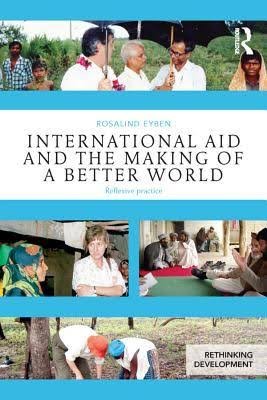The Making of a Better World
Rosalind Eyben spent a career as a practitioner in international development and then as an academic on the subject. Her 2014 book, "International Aid and the Making of a Better World: Reflexive Practice" is one of the few books that critically self-analyzes a personal trajectory. Unlike some personal journals/journeys of aid workers, this focuses upon teaching the processes of being reflexive and the value it adds. It poses challenging questions to the sector, and of the author, the latter of which provides a powerful way of teaching the reflexive practice. The book's preface opens with: "These people were working in international development to help make a more just and fairer world, yet many of them, like me, sometimes worried we were inadvertently helping maintain the inequities we aimed to reduce. This book is for all such development professionals" (p. xii).
One of the interesting experiences Eyben brings is that of the transitional period between colonial administration and aid, and the similar faces with which those posts were staffed. More broadly, the practice remains heavily influenced by this history: "international aid's colonial roots have continued to shape aid practice, most obviously in the earlier decades through the lived experience of many development practitioners who had started their careers in colonial administration… More contentious is the postcolonial studies argument that the mindset of development agencies has not shifted since colonial times… Is the focus on alleviating poverty a continuation of the colonial discourse of the White Man's Burden in which famine is the consequence of generic poverty and never due to global inequalities and decisions made by the rich and powerful? Development professionals, whatever their origins be it First or Third World, should debate the colonial legacy of development and the implications for practice of a discourse that is alleged to be arrogant, ethnocentric, rooted in European cultures and reflective of a dominant Western world view" (p. 40).
Throughout the book, race, gender and power are explored in critical and reflexive ways. For example, Eyben writes: "When I barged my way to the head of the queue in a Kinshasa hospital by taking advantage of my whiteness to give my child's life priority over the lives of other women's children, it seemed a perfectly natural thing for me to do. Almost, but not quite normal, otherwise I would not have remembered it. I have probably chosen to forget other occasions when I may have done something similar. In the early years of international aid, racism and gender discrimination were more prevalent and most development professionals were white and male" (p. 59).
On participation and human rights:
- "There was an alternative vision of civil society – the one I liked – associated with people-centred approaches to development in which not everything could be left to markets. Ideas about participation, growing in influence since the 1970s, joined up with a post-Cold-War emphasis on the indivisibility of human rights that by the end of the 1990s led to 'rights-based approaches' to development. I saw understanding participation as a right, rather than as an instrument to greater aid effectiveness, as one of the biggest shifts in donor thinking in recent years. I believe it meant switching from a technical to political understanding of development." (p. 87)
- "'The long and the short of it,' reflected the chairman of the village development committee, 'is that we used to see some benefits from aid money – a water scheme or a road. Now that you foolish donors are giving all your money to the politicians it disappears into their pockets and we see none of it. Are you from cloud cuckoo land?" (p. 116)
- "Equally important principles were in conflict – of aid helping people realise their rights and of recipient governments' controlling the aid they receive. Finding this nearly impossible to resolve, I sometimes chose to ignore one of the principles and paint a simpler picture of development practice, where the decisions were either right or wrong in accordance with established procedures and available evidence." (p. 126)
Although it may have been unintended, for me Eyben's book was also a quasi-ethnographic work of an aid workers life that I have not lived. I've not lived in colonial homes or attended expat parties, nor have I lived in gated communities or compounds. I have worked in countries that were not always safe or calm, but my experience, thus far, has been quite different than the one described. In the spirit of reflexivity, this has not always been in the spirit of solidarity. At times it was akin to one of Rosalind's fellow travelers, who started out in the sector that resulted in a particular type of engagement. However, I have also made purposeful choices not to live the 'expat life' when those opportunities did arise.

